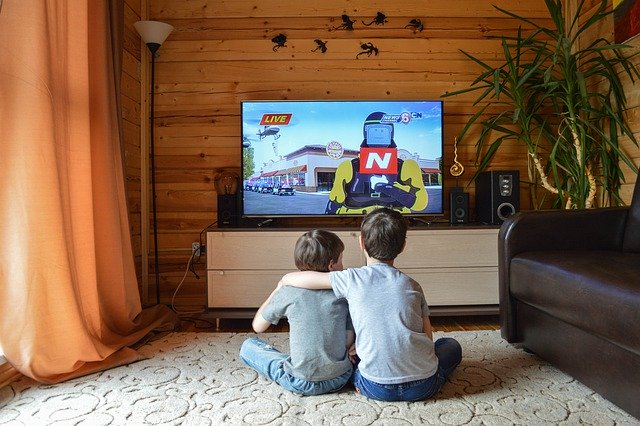
Are you concerned, your kids are overexposed to digital devices like mobile phones, tablets, TV, and gaming systems? But, how to limit your kids’ screen time on digital devices?
In the current pandemic situation, where the learning has taken a paradigm shift from usual school learning to learning online, your children are now even more exposed to these devices. Moreover, it’s difficult to limit the screen time they spend using digital devices because schools nowadays prefer to upload most of the homework online. Consequently, it has added more to your worries.
However, since the learning should go on, you cannot forgo online classes but yes, you can strategically limit the screen time for your kids when they are using it for other purposes. Extensive use of digital devices can be detrimental to your kids’ well-being.
In my WhatsApp group, I often find parents criticizing the school, on how increased screen time (online classes), is affecting their children’s day to day life and health. But what about their children, spending hours in front of the mobile phones and tablets gaming and engaged in socializing over social media platforms?
Honestly speaking, I don’t find many parents actually being bothered, or maybe they are not aware of what damage is it causing to their children when they are glued to their devices longer than required. Of course, exceptions are always there.
Check out the video below on how to limit your kids' screen time
When it is an easy way out for you
How many of you are willing to accept, that it is an easy way out to keep them occupied while you are busy doing something?
Whenever I visit my sister’s home, I see my 2-year-old nephew always occupied with watching some kid’s video on a tablet. My sister said it keeps him busy while she could have some ‘me time’ for her and could also finish her household chores. I was taken aback, listening to her response.
It was an easy way out to keep her son occupied, while she could hang on with her friends chit-chatting over the phone for hours.
I understand parenting is a demanding process and needs perseverance and patience, but as parents, you are responsible for what is good and bad for your children.
When you are an unobservant parent
Many parents are so ignorant and unobservant that they don’t even realize what harm they are causing to their kids by allowing them to watch TV for hours.
The other day my friend called up. She was upset because her daughter’s teacher had called up to inform about her 5-year-old is not being attentive and taking any interest in studies. This was shocking for my friend as her daughter was performing well till the last year.
The cause of the problem was right in front of her. Her daughter used to watch TV for hours and that too, sitting so close. Only when the teacher informed about the declining grades, she came to diagnose that her daughter was finding difficulty reading the board, and she needed to visit an ophthalmologist at the earliest.
Had my friend been well aware of the adverse effects of excessive TV watching, she could have saved her daughter from wearing spectacles since childhood.
How overexposure to digital devices is affecting your child’s health

- An evident and obvious health concern which is on the rise in children, due to being attached to their gadgets, is the eye strain and Computer Vision Syndrome. It is a condition that develops when your child focuses too close and too long on the screen, resulting in dryness, headache, and irritable eyes. Eventually, this can also lead to the problem of nearsightedness in your child.
- It might be a normal tendency for your children to munch while watching television. Moreover, attractive food advertisements might also make it more difficult to resist. Snacking often can give rise to other serious physical and mental diseases like obesity and depression in your kids.
- The virtual world has an immediate impact on your child’s behavior. Excessive screen time spent on watching TV or gaming can cause your children irritable, aggressive, selfish, and impatient.
- Your kids exposed to violence on television or one of those destructive mobile games can show traits of higher aggression. Access to such content can be distressing or stimulating. Too much visual stimuli can impact your child’s development of imagination.
Some more effects of excessive use of screen time are:
- Excessive screen time will reduce CRITICAL THINKING in your children. Not surprisingly, studies believe, that the increase in the usage of technology has led to a decrease in daily reading among children. Also, most of the text displayed on the digital devices, is so brief, in length, that your children are not challenged enough to think critically or expand on their thoughts. Rather encourage them to read books to enhance their imagination and critical thinking skills.
- Excessive use of social media, taking selfies every hour, and posting it on social media can trigger obsessions with one’s appearances, especially among teen girls. Yearning for ‘likes’ and desire for constant appreciation, will lead to self-esteem and anxiety-related issues in your kids if it does not happen so.
- Your teens may stay up at night texting their friends, resulting in sleep deprivation, instead of getting much-needed rest.
- The blue light that emits from the phone screen interferes with the sleep cycle of your children, by delaying the release of a primary sleep hormone – melatonin.
- Watching videos, gaming and socializing online can take up a lot of you child’s time leading to poor time management. Consequently, resulting in unfinished assignments, less time for preparation of tests and decline in grades.
Recommended Time Limits on Screen Use
To help reduce your child’s screen time, the general guidelines for screen time, which includes TV, cell phones, tablets, computers, and gaming, are:
Ages 0 to 18 months: No screen time. Occasional video conferencing with relatives.
Ages 18 to 24 months: Only educational content. Co-view it and discuss it with your child.
Ages 2 to 5 years: One hour a day of high-quality, educational content.
Ages 6 and older: Place limits on daily screen use and monitor what your children view
How to limit your kid's screen time on digital devices
Digital devices have become an integral part of our life. As parents, to derive the maximum benefits of technology, you need to monitor and supervise your kids’ screen time while they are connected to the virtual world.
Fortunately, you can use certain strategies that will help you successfully limit your child’s screen time — and keep a tab on yours as well.
Some measures you can take to limit your kids’ screen time are:

1. Set the example by modeling behavior
Children are hugely influenced by the behavior of their parents. They learn what they see happening in their surroundings. If your kids see you involved with your phone or watching TV more often, then they are likely to do the same. To limit your kids’ screen time, you will have to set an example by doing the same yourself.
It’s more of a habit-forming phenomenon and as parents, it is your responsibility to encourage healthy habits and behavior and, limiting the unhealthy ones, from the early years of childhood. Doing so will help your kids follow through and someday choose it for themselves.
2. Set rules and viewing schedule
There is no need to completely shut your kids from using devices. Set rules on what content they can watch and what will be the screen timeout. If your kids understand, that they will be allowed to watch or play if they stick to rules, it will be much easier to limit their screen time.
Be sure, you are firm on your kids about the viewing schedule and do not pay heed to their tantrums. Do not ever negotiate on these rules with them, as doing so will let them take it for granted and your kids will start looking for loopholes.
Setting rules about screen time will also help your children manage their time efficiently and productively.
3. Be watchful
You should not allow taking phones and gadgets to their rooms. Rather, let them surf their devices in the living room. This will help you keep a check on their activities and limit their screen time too. Also, you should be informed and involved in current digital trends, your kids may come across.
Not to mention, do not get a TV installed in your kids’ room for their convenience.
4. Encourage them to read

Another way to reduce your children’s device screen time is to encourage them to read storybooks or anything that interests them. Be sure to set some time aside daily for reading. Reading books will not only help them develop critical thinking but also help them to express or converse by referring to what they have read in a better way. Hera are some popular books for your kids to read.
It is important to let your children explore old-fashioned imaginative play and, also, to let their imaginations run wild through storybooks.
5. Engage your kids in physical activities.
There is nothing better than physical activities to keep your children away from the virtual world. Involving them in sports, and other physical activities like cycling, exercising, and swimming will you channelize their bursting energies in a proper direction. Not to mention, physical activities will keep them fit and healthy too. You can encourage them to play board games as well, when they are indoors.
Besides, physically active children tend to fall asleep faster and are likely to spend less time on screen.
6. Motivate your kids to pursue a hobby

My teenager son is fond of playing the keyboard, which keeps him engaged for a long time. As much as my son loves playing keyboard, so is my 9-year-old daughter who loves playing with colors. Pursuing a hobby not only reduces their involvement with digital devices but also helps them learn something productive.
Encourage your kids to pursue a hobby. It will not only reduce their screen time, but also help them utilize their time productively.
7. Value Family Meals
Most mothers let their children sit in front of the TV during dinner so that they finish up their meals quickly.
But, the dinner hour or an hour before bedtime can be great times for the entire family to have quality time together.
Conversation among the family members during the meals helps you and your children bond well with one another. Don’t let these digital devices steal your valuable time.
8. Do not use devices as a reward or punishment.
Don’t use TV to reward or punish your child. Practices like this make your children appear these devices even more important and will be more inclined towards them. Consequently, the whole effort of limiting your kids’ screen time will backfire on you.
9. Install Apps to set the screen timeout

Screen Time lets you know how much time you and your kids spend on apps, websites, and more. This way, you can make more informed decisions about how your kids use the devices, and set limits for them if you’d like to.
You can install parental control apps on your phone to keep track of your children’s activities, like what they search online or how much screen time used, location tracker, etc.
Some popular kids’ screen time apps which you can download from the Google Play Store are:
Parental Control – Screen Time & Location Tracker by Screen Time Labs
Kids Place – Parental Control and Child Lock by Kiddoware
How to set screen time limits for your child on different devices
Xbox One and Windows 10 devices
If you are a mother of a teenager, especially a boy, then you must be knowing what thrill does your lad gets, while gaming on Xbox One.
Do you know you can select the schedule for each day, when, and how much your child can use Xbox? Follow the instructions to limit your child’s screen time.
Screen Time on your iPhone, iPad, or iPod touch
The same can be done if your children are using an iPhone or iPad. Read and follow the instructions.
For chrome and Android Users
Read on to learn how to turn on Screen Time, view your report and set limits, and manage a child’s device.
Limiting your child’s screen time may seem like an impossible task or too challenging, but it is worth fighting.
While it might seem like a good idea to keep track of your kids’ screen time through parental control apps, it’s only an external control module to manipulate your kids’ behavior. True discipline can only be achieved when you can motivate your children and inculcate a habit in them to use screen time on their devices wisely.
Krishna is a Management graduate in Human Resource. She is an avid reader, knowledge seeker, and an adoring mother of two lovely kids.